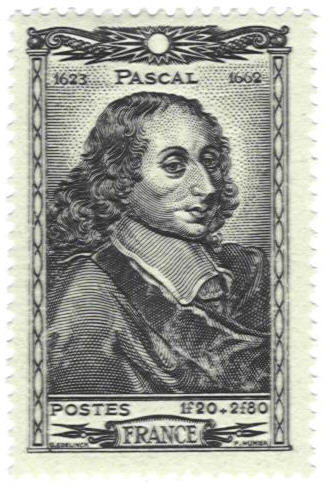

Blaise Pascal (1623-1662)
Blaise Pascal (1623-1662)
France (1962), No. 1038
France (1944), No. b181

Blaise Pascal (1623-1662)
Monaco (1973), No. 875
Blaise Pascal
Blaise Pascal was born at Cleremont Ferrand and was mathematically precocious publishing his `Essay on Conic Sections' at the age of 16. At the age of 12 or 13 he became a member of Mersenne's weekly discussion group, which later developed into the French Academy; during Pascal's time the group included the mathematician
Descartes and Desargues. At the age of 23 Pascal turned towards religion and away from the worldly pleasures of mathematics. He returned to mathematics only once. When suffering from a toothache, he thought about some problems concerning the cycloid and his pain went away; he interpreted this as divine approval and completed several treatises on the topic. Ironically, in view of his somewhat mystical religious beliefs, he discovered the properties of what is now known as Pascal's Triangle while solving, along with Fermat,a problem about gamblers dividing the stakes in an interrupted game of chance. There is a famous quote of Newton's saying `If
I have seen farther than others, it is because I have stood on the shoulders of giants'; Newton is referring to Descartes, Fermat, and Kepler. Pascal is sometimes called the greatest `might-have-been' in mathematics; since he clearly was of superior ability and in close contact with the two giants Descartes and Pascal, he could very well have discovered the calculus had he stayed with mathematics instead of turning to religion.
 |
 |
|
Blaise Pascal (1623-1662) |
Blaise Pascal (1623-1662) |
|
France (1962), No. 1038 |
France (1944), No. b181 |
 |
|
|
Blaise Pascal (1623-1662) |
|
|
Monaco (1973), No. 875 |